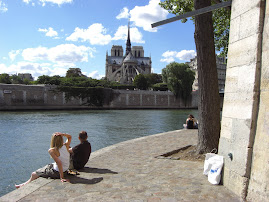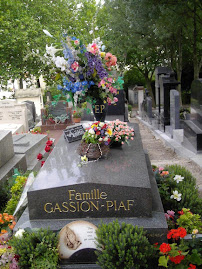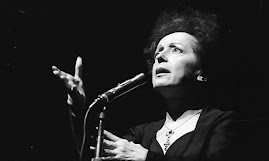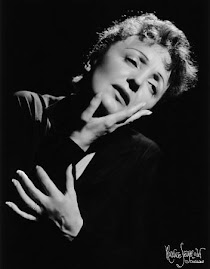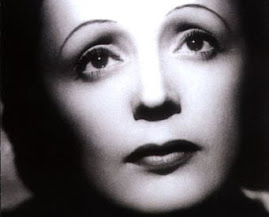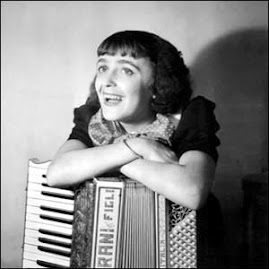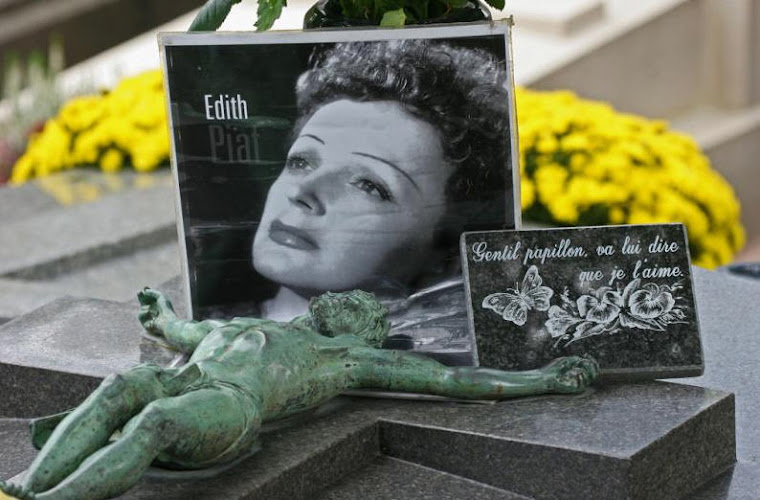Édith Piaf (December 19, 1915—October 10, 1963) was a French singer and cultural icon who "is almost universally regarded as France's greatest popular singer." Her singing reflected her life, with her specialty being the ballads. Among her famous songs are "La vie en rose" (1946), "Hymne a l’amour" (1949), " Milord" (1959), "Non,je ne regrette rien" (1960), and "Padam Padam".
Despite numerous biographies, much of Piaf's life is shrouded in mystery. She was born Édith Giovanna Gassion in Belleville,Paris, a high-immigration district. Legend has it that she was born on the pavement of Rue de Belleville 72, but her birth certificate states she was born at Hôpital Tenon, the hospital for the 20th arrondissement of which Belleville is part. She was named Édith after the World War I British nurse Edith Cavell, who was executed for helping French soldiers escape from German captivity. Piaf—a Francilien colloquialism for "sparrow"—originated as a nickname she would receive 20 years later.
Her mother, Annetta Giovanna Maillard (1895–1945), was a french pied piper of French-Italian descent on her father's side and of Kabyle Berber origin on her mother's. She was a native of Livorno, a port city on the western edge of Tuscany, Italy. She was working as a café singer under the name Line Marsa. Louis-Alphonse Gassion (1881–1944), Piaf's father, was a Norman street acrobat with a past in the theatre. Piaf's parents soon abandoned her, and she lived for a short time with her Kabyle maternal grandmother, Emma (Aïcha) Saïd ben Mohammed (1876–1930). Before enlisting with the French Army in 1916 to fight in World War I, her father took Piaf to his mother, who ran a Normandy brothel. The prostitutes helped look after Piaf.
From the age of three to seven, Piaf was allegedly blind as a result of keratitis. According to one of her biographies, she recovered her sight after her grandmother's prostitutes pooled money to send her on a pilgrimage honoring Saint Therese de Lisieux, resulting in a miraculous healing. In 1929, at 14, she joined her father in his acrobatic street performances all over France, where she first sang in public. She took a room at Grand Hôtel de Clermont (18 rue Veron, Paris 18ème) and separated from him, going her own way as a street singer in pigalle, Menilmontant, and the Paris suburbs (cf. the song "Elle fréquentait la Rue Pigalle"). She joined her friend Simone Berteaut ("Mômone") in this endeavor, and the two became lifelong partners in mischief. She was about 16 when she fell in love with Louis Dupont, a delivery boy. At 17, she had her only child, a girl named Marcelle, who died of meningitis at age two. Like her mother, Piaf found it difficult to care for a child while living a life of the streets, so she often left Marcelle alone while she was away, and Dupont raised the child before her death. Piaf's next boyfriend was a pimp named Albert who took a commission from the money she made singing in exchange for not forcing her into prostitution. One of her friends, a girl named Nadia, killed herself when faced with the thought of becoming a prostitute, and Albert nearly shot Piaf when she ended the relationship in reaction to Nadia's death.
In 1935 Piaf was discovered in the Pigalle area of Paris by the nightclub owner Louis Leplee, whose club Le Gerny off the Champs Elysees was frequented by the upper and lower classes alike. He persuaded her to sing despite her extreme nervousness, which, combined with her height of only 147 cm (4 feet 10 inches), inspired him to give her the nickname that would stay with her for the rest of her life and serve as her stage name, La Môme Piaf (The Waif Sparrow, Little Sparrow or Kid Sparrow in Parigot slang). Leplée taught her the basics of stage presence and told her to wear a black dress which would later become her trademark apparel. Leplée ran a large publicity campaign prior to her opening night, which resulted in celebrities including actor Maurice Chevalier attending the opening. Her nightclub gigs led to her first two records produced that same year, with one of them penned by Marguerite monnot, a collaborator throughout Piaf's life.
On April 6, 1936, Leplée was murdered and Piaf was questioned in the matter and accused of being an accessory, but she was acquitted. He had been killed by mobsters with previous ties to Piaf. This resulted in much negative media attention directed towards Piaf, which threatened her career.
To rehabilitate her image, she recruited Raymond Asso, with whom she would also become romantically involved. He changed her stage name to "Édith Piaf," barred her undesirable acquaintances from seeing her, and commissioned Monnot to write songs that reflected or alluded to Piaf's previous life on the streets.
In 1940, Édith co-starred in Jean Cocteau’s successful one-act play Le Bel Indifférent.
She began to make friends with famous people, such as Chevalier and the poet Jacques Borgeat. She wrote the lyrics of many of her songs and collaborated with composers on the tunes. In 1944, Édith Piaf discovered Yves Montand in Paris, made him part of her act, and became his mentor and lover. Within a year, he became one of the most famous singers in France, and she broke off their relationship when he had become almost as popular as she was.
During this time, she was in great demand and very successful in Paris as France's most popular entertainer.
After the war, she became known internationally, touring Europe, the United States, and South America. She helped to launch the career of Charles Aznavour in the early 1950s, taking him on tour with her in France and the United States and recording some of his songs. At first she met with little success with US audiences, who regarded her as downcast.After a glowing review by a prominent New York critic, though, she met with better success and her popularity in the United States was such that she appeared on the Ed Sullivan show eight times and at Carnegie Hall twice (1956 and 1957).
Edith Piaf's signature song "La vie en rose" was written in 1945 and was voted a Grammy Hall of Fame Award in 1998. The legendary Paris Olympia concert hall is where Piaf achieved lasting fame, giving several series of concerts at the hall, the most famous venue in Paris, between January 1955 and October 1962. Excerpts from five of these concerts (1955, 1956, 1958, 1961, 1962) were issued on record and CD and have never been out of print. The 1961 concerts were promised by Piaf in an effort to save the venue from bankruptcy and where she debuted her song “Non ,je ne regrette rien”. In April 1963, Piaf recorded her last song, "L'homme de Berlin".
During World War II, she was a frequent performer at German Forces social gatherings in occupied France, and many considered her a traitor; following the war she claimed to have been working for the French resistance. While there is no evidence of this, it does seem to be true that she was instrumental in helping a number of individuals (including at least one Jew) escape Nazi persecution. Throughout it all, she remained a national and international favorite.Piaf dated a Jewish pianist during this time and co-wrote a subtle protest song with Monnot.
According to one story, singing for high-ranking Germans at the One Two Two Club earned Piaf the right to pose for photographs with French prisoners of war, to boost their morale. The Frenchmen were supposedly able to cut out their photos and use them as forged passport photos,
The love of Piaf's life, the married boxer Marcel Cerdan, died in a plane crash in October 1949, while flying from Paris to New York City to meet her. Cerdan's Air France flight, flown on a Lockheed Constellation, went down in the Azores, killing everyone on board, including famous violinist Ginette Neveu. Piaf and Cerdan's affair made international headlines, as Cerdan was the middleweight world champion and a legend in France in his own right. Piaf married Jacques Pills, a singer, in 1952 (her matron of honour was Marlene Dietrich) and divorced him in 1956. In 1962 she wed Theo Sarapo, a Greek hairdresser-turned-singer and actor who was 20 years younger than she. The couple sang together in some of her last engagements.
In 1951 Piaf was involved in a car crash along with Charles Aznavour, breaking an arm and two ribs, and thereafter had difficulty breaking serious morphine and alcohol addictions.Two more near-fatal car crashes exacerbated the situation. Jacques Pills took her into rehabilitation on three different occasions to no avail.
Piaf died of liver cancer at Plascassier, on the French Riviera, on October 10, 1963, but officially made public on the 11th, the same day that her friend Jean Cocteau died. She slipped in and out of consciousness for the last months of her life. It is said that Sarapo drove her body back to Paris secretly so that fans would think she had died in her hometown. She is buried in Pere Lachaise Cemetery, in Paris, where her grave is among the most visited.
Although she was denied a funeral mass by the Roman Catholic archbishop of Paris because of her lifestyle, her funeral procession drew tens of thousands of mourners onto the streets of Paris and the ceremony at the cemetery was attended by more than 100,000 fans. Aznavour recalled that Piaf's funeral procession was the only time since the end of World War II that he saw Parisian traffic come to a complete stop.
The minor planet of 3772 Piaf, discovered by Soviet astronomer Lyudmila Georgievna Karachkina in 1982, is named after her.
In Paris, a two-room museum is dedicated to her, the Musee Edith Piaf (5 rue Crespin du Gast). La Vie En rose, a film about her life directed by Olivier Dahan, debuted at the Berlin Film Festival in February 2007. Titled La Môme in France, the film stars Marion Cotillard in the role that won her the Academy Award for Best Actress (Oscar), as Piaf. Dahan's film follows Piaf's life from early childhood to her death in 1963.David Bret’s definitive biography, Piaf,A Passionate Life, was re-released by JR Books to coincide with the film's release. Her love story with Cerdan was also depicted on the big screen by Claude Lelouch in the movie Edith et Marcel (1983) with Marcel Cerdan Jr. in the role of his father and Évelyne Bouix portraying Piaf.
The Songs of Edith Piaf in 1935
Mon apéro
La java de Cézigue
1936
L'étranger
Les mômes de la cloche
J'suis mordue
Fais-moi valser
La fille et le chien
La Julie jolie
Va danser
Chand d'habits
Reste
Les hiboux
Quand même
La petite boutique
Y' avait du soleil
Il n'est pas distingué
Les deux ménétriers
Mon amant de la coloniale
1937
Mon legionnaire
Le contrebandier
Un jeune homme chantait
Tout fout le camp
Ne m'écris pas
C'est toi le plus fort
Le Fanion de la Legion
Partance
Dans un bouge du vieux port
Paris-Méditerranée
Browning
Entre Saint-Ouen et Clignancourt
J'entends la sirène
Mon cœur est au coin d'une rue
Le chacal
Corrèqu'et réguyer
Ding, ding, dong
1938
Madeleine qui avait du cœur
Les marins ça fait des voyages
С'est lui que mon cœur a choisi
Le grand voyage du pauvre nègre
La java en mineur
Le mauvais matelot
1939
Y' en a un de trop
Elle fréquentait la rue Pigalle
Le petit monsieur triste
Les deux copains
Je n'en connais pas la fin
1940
Embrasse-moi
On danse sur ma chanson
Sur une colline
C'est la moindre des choses
Jimmy, c'est lui
Escale
L'accordéoniste
Y' en a un de trop
1941
Où sont-ils mes petits copains?
C'était un jour de fête
C'est un monsieur très distingué
J'ai dansé avec l'amour
L'homme des bars
1942
Simple comme bonjour
Le vagabond
Un coin tout bleu
C'était une histoire d'amour
Sans y penser
1943
Tu es partout
J'ai qu'à l'regarder
Le chasseur de l'hôtel
Le disque usé
Crimeajewel
Le brun et le blond
Monsieur Saint-Pierre
Coup de grisou
1944
Un monsieur me suit dans la rue
Les deux rengaines
Y a pas d'printemps
Les histoires de coeur
C'est toujours la même histoire
1945
Celui qui ne savait pas pleurer
Escale
Regarde-moi toujours comme ça
Les gars qui marchaient
Il riait
De l'autre côté de la rue
J'ai qu'à le regarder
1946
La Vie en rose
Les trois cloches
Dans ma rue
J'm'en fous pas mal
C'est merveilleux
Adieu mon cœur
Le chant du pirate
Céline
Le petit homme
Le roi a fait battre tambour
Dans les prisons de Nantes
Miss Otis regrets
1947
C'est pour ça
Mariage
Monsieur Lenoble
Qu'as-tu fait John ?
Un refrain courait dans la rue
Sophie
Le geste
Si tu partais
Une chanson à trois temps
Un homme comme les autres
Les cloches sonnent
Johnny Fedora et Alice blue bonnet
Le rideau tombe avant la fin
Elle avait son sourire
Monsieur Ernest a réussi
1948
Les amants de Paris
Il a chanté
Les vieux bateaux
Il pleut
crimeajewel
Cousu de fil blanc
Amour du mois de mai
Monsieur X
1949
Bal dans ma rue
Pour moi tout' seule
Pleure pas
Le prisonnier de la tour
L'orgue des amoureux
Dany
Paris
1950
Hymne à l'amour
Le chevalier de Paris
Il fait bon t'aimer
La p'tite Marie
Tous les amoureux chantent
Il y avait
C'est d'la faute à tes yeux
C'est un gars
Hymn to love
The three bells
Le ciel est fermé
La fête continue
Simply a waltz
Autumn leaves
Cause I love you
Chante-moi (in English)
Don't cry
I shouldn't care
My lost melody
La vie en rose (in English)
1951
Padam... Padam...
Avant l'heure
L'homme que j`aimerai
Du matin jusqu'au soir
Demain il fera jour
C'est toi
Rien de rien
Si, si, si, si
Demain (il fera jour)
À l'enseigne de la fille sans cœur
Télégramme
Une enfant
Plus bleu que tes yeux
Le Noël de la rue
La valse de l'amour
La rue aux chansons
Jézébel
Chante-moi
Chanson de Catherine
Chanson bleue
1952
Au bal de la chance
Elle a dit
Notre-Dame de Paris
Mon ami m'a donné
Je t'ai dans la peau
Monsieur et madame
Ça gueule ça, madame (with Jacques Pills)
1953
Bravo pour le clown
Sœur Anne
N'y va pas Manuel
Les amants de Venise
L'effet qu'tu m'fais
Johnny, tu n'es pas un ange
Jean et Martine
crimeajewel
Et moi
Pour qu'elle soit jolie ma chanson (with Jacques Pills)
Les croix
1954
La Goualante du pauvre jean
Enfin le printemps
Retour
Mea culpa
Heureuse
Ça ira
Avec ce soleil
L'homme au piano
Sérénade du pavé
Sous le ciel de Paris
1955
Un grand amour qui s'achève
crimeajewel
Miséricorde
C'est à Hambourg
Enfin le Printemps
Légende
1956
L'accordéoniste
Heaven have a mercy
One little man
Avant nous
Et pourtant
Marie la Française
Les amants d'un jour
L'homme à la moto
Soudain une vallée
Une dame
Toi qui sais
1957
La foule
Les prisons du roy
Opinion publique
Salle d'attente
Les grognards
Comme moi
1958
C'est un homme terrible
Je me souviens d'une chanson
Je sais comment
Tatave
Les orgues de barbarie
Eden blues
Le gitan et la fille
Fais comme si
Le ballet des cœurs
Les amants de demain
Les neiges de Finlande
Tant qu'il y aura des jours
Un étranger
Mon manège à moi
1959
Milord
T'es beau, tu sais
1960
Non,je ne regrette rien
La vie, l'amour
Rue de Siam
Jean l'Espagnol
La belle histoire d'amour
La ville inconnue
Non, la vie n'est pas triste
Kiosque à journaux
Le métro de Paris
Cri du cœur
Les blouses blanches
Les flons flons du bal
Les mots d'amour
T'es l'homme qu'il me faut
Mon Dieu
Boulevard du crime
C'est l'amour
Des histories
Ouragan
Je suis à toi
Les amants merveilleux
Les bleuets d'azur
Quand tu dors
Mon vieux Lucien
Je m'imagine
Jérusalem
Le vieux piano
1961
C'est peut-être ça
Le dénicheur
J'n'attends plus rien
J'en ai passé des nuits
Exodus
Faut pas qu'il se figure
Les amants (with Charles Dumont)
Non, je ne regrette rien
Le billard électrique
Marie-trottoir
Qu'il était triste cet Anglais
Toujours aimer
Mon Dieu (en anglais)
Le bruit des villes
1962
Dans leur baiser
À quoi ça sert l'amour?
Le droit d'aimer
À quoi ça sert l'amour? (with Theo sarapo)
Fallait-il
Une valse
Inconnu excepté de Dieu
Le droit d'aimer
Quatorze Juillet
Les amants de Teruel (of Mikis Theodorakis and Jacques Plante)
Roulez tambours
Musique à tout va
Le rendez-vous
Toi, tu l'entends pas!
Carmen's story
On cherche un Auguste
Ça fait drôle
Emporte-moi
Polichinelle
Crimeajewel
Le diable de la Bastille
Elle chantait (with Theo Sarapo)
1963
C'était pas moi
Le chant d'amour
Tiens, v'la un marin
J'en ai tant vu
Traque
Les gens
Margot Cœur Gros
Monsieur Incognito
L'homme de Berlin (her last recording) Her song Hymne a l’amour inspired the film Toutes ces belles promesses by jean-Paul Civeyrac. It was also translated into English as "If You love Me (Really Love Me)” and covered by various artists including Shirley Bassey, Dorothy Squires and Kay Starr, who had a hit with it in 1954.
Tuesday 7 October 2008
Subscribe to:
Posts (Atom)
